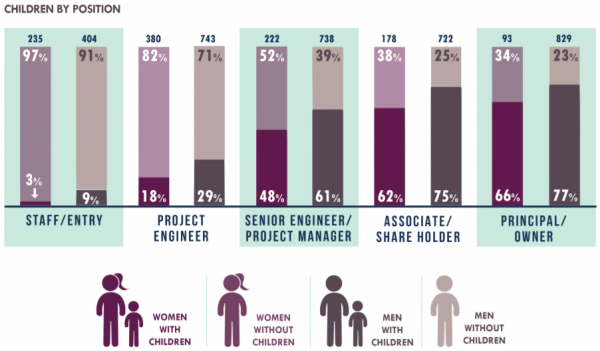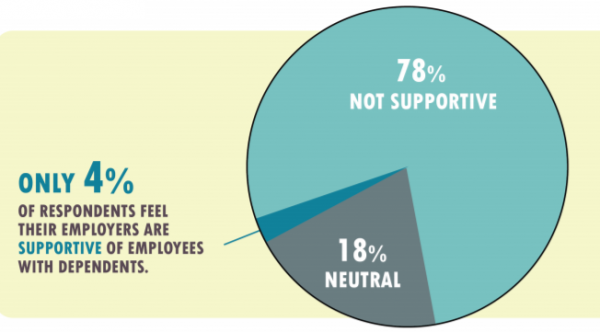Breakdown of Structural Engineers with/without Children
Not just for structural engineers, but depending on where you are in your career, the statistical likelihood that you have children differs greatly. The demographics of the entire survey in general indicated a male majority when it comes to engineers, which indicates that as of now, structural engineering is a male dominated field. Interestingly, 55% of male respondents had children, while only 33% of female respondents had children [1]. More on potential reasoning for this in a later section. If you unbox those two numbers a bit more, you intuitively notice that the younger the engineer is, the less have children, while more established engineers in leadership positions have a higher propensity to have children.
Figure 1. breakdown of men and women with/without children depending on the stage of their career [1]
Another interesting finding from the survey is that engineers from smaller firms seem to have children at a higher rate than engineers working for large firms, and that engineers who work at female-led firms are much more likely to have children than male-led ones. From this, maybe we can conclude that with smaller firms, there is a closer-knit feeling between members where they feel free to have children. Similarly to the latter scenario, female leadership obviously sends, consciously or unconsciously, a different message to employees.Caregiving and Perception of Having Children
Now that we know who among structural engineers is and isn't having kids, let's take a look at their respective thoughts on the priority of caregiving versus career. The survey asked respondents "how often they felt that they had to choose between work and caregiving" [1]. Of those respondents, female surveyors found themselves in that predicament at a much higher clip than men. 57% of women said they felt they had to choose "often" or "always", compared to only 20% of men [1]. From this, we can infer that the female respondents of this survey feel more pressure to put aside their career or work in order to take care of their child. This added pressure might be contributing to the lower rate of children in female structural engineers that was indicated earlier. In fact, when looking at the "perceived impact of children on career" question asked to the 2400 group with children, we continue to see a trend from the female perspective. A whopping 61% of female respondents felt like having a child has an overall negative impact on their career, compared to just 17% for men [1]. Conversely, only 9% of women think it's a positive, versus 28% for men.
Figure 2. The perceived impact of having children on their careers, separated by men and women [1].
Clearly we can see that there is a divide between men and women when it comes to the expectations and perception of having children while employed as a structural engineer. Hopefully, going forward the industry can bridge this gap so that every structural engineer regardless of gender feels confident in their decision to have children, or not. One thing every engineer can agree on though, is the lack of support they feel from their employers when they do choose to have children. According to the survey, only 4% of respondents thought their firm was supportive of employees with dependents (including children). 78% think their employer is not supportive, and 18% are neutral on the subject [1].
Figure 3. Pie graph depicting respondents' thoughts on if their 'firm supports employees with dependents' [1].
References
- Clousing, Ricky, et al. “2020 Survey Topic Brief Performance Feedback.” Committee Publications, www.se3committee.com/publications.
Trevor Solie
Structural Engineer
BEng (Civil)
LinkedIn
Structural Engineer
BEng (Civil)



